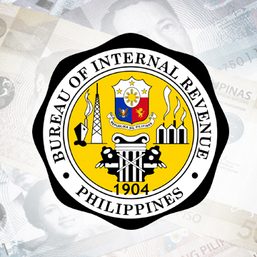SUMMARY
This is AI generated summarization, which may have errors. For context, always refer to the full article.

MANILA, Philippines – The Marcos administration is aiming to raise at least P4.3 trillion for 2024 to fund the national budget, all while avoiding the introduction of unpopular new taxes to rev up revenues.
New Finance Secretary Ralph Recto said the target, which is 11.9% higher than the projected collections made in 2023, is possible by improving how the Bureau of Internal Revenue (BIR) and Bureau of Customs (BOC) collect taxes.
“There are no plans of imposing additional new taxes. I think our first job is to collect what is on the table,” Recto said in his first media briefing on Wednesday, January 24.
Recto went on to explain that imposing additional taxes could raise prices of goods amid an already high inflationary environment.
Recto’s predecessor, Benjamin Diokno, earlier mulled higher taxes on junk food and sweetened beverages.
The Department of Finance has also proposed a revamp on motor vehicle road user’s tax, but Recto said they are now “tempering” it.
“Motorists pay a lot of taxes…there are excise taxes and VAT (value added tax) on oil, there are excise taxes, duties, and VAT on vehicles. Today, 50% or thereabouts of vehicles are unregistered. And if you impose higher taxes, maybe more vehicles will not register,” Recto said.
In a nutshell, Recto is looking for ways to collect more from the current taxes imposed by the tax code.
President Ferdinand Marcos Jr. recently signed into law the Ease of Paying Taxes Act, which aims to help taxpayers comply with the law. Part of the law is the digitalization of services, which is deemed to improve compliance.
Almost, but not quite
Data showed that while the previous Duterte administration raised taxes through the controversial TRAIN Law, the BIR has not met its yearly target.
It was only able to exceed its collection targets in 2020, when the government was forced to revise the goal downward due to the pandemic-induced recession.
"I think the best way to raise revenues is to grow the economy and to expand the tax base," Recto said on Wednesday.
From January to November 2023, the BIR collected a total of P1.85 trillion. It needed to collect P78 billion last December to reach the full-year target of P2.63 trillion.
BIR Commissioner Romeo Lumagui Jr. recently initiated a nationwide tax compliance verification drive, an initiative that does not punish companies but encourages them to pay the right taxes.
"We noticed a lot of violations, but we educated them. We did not impose any penalties…so we taught them…what their violations were," Lumagui said.
Lumagui also recently reshuffled hundreds of staff from different district offices, a move viewed to clean up the ranks of the BIR.
Meanwhile, Customs Commissioner Bienvenido Rubio has a tougher job as he needs to increase the BOC's collections by as much as 20% as they need to collect P1 trillion for 2024.
In 2023, they were able to collect P883 billion.
"I do not assume [an] increase of volume and on the possible assumptions of an increase in the exchange rate of dollars. So, what we do is to increase our efficiency," Rubio said. – Rappler.com
Add a comment
How does this make you feel?








![[Ask the Tax Whiz] Withholding tax under Ease of Paying Taxes law](https://www.rappler.com/tachyon/2022/11/tax-papers-shutterstock.jpg?resize=257%2C257&crop=205px%2C0px%2C900px%2C900px)

![[Ask The Tax Whiz] Output VAT credit on uncollected receivables: What taxpayers must know](https://www.rappler.com/tachyon/2022/11/tax-papers-hand-shutterstock.jpg?resize=257%2C257&crop_strategy=attention)
![[Ask The Tax Whiz] What’s new on invoicing requirements under the Ease of Paying Taxes law?](https://www.rappler.com/tachyon/2024/06/tax-whiz-receipts.jpg?resize=257%2C257&crop=459px%2C0px%2C720px%2C720px)
There are no comments yet. Add your comment to start the conversation.